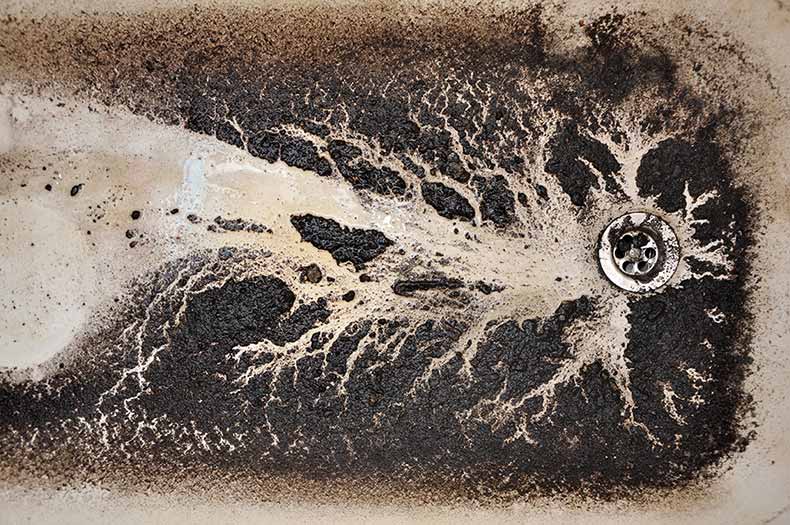Deciphering the Mystery of Discharge in the Bathtub
Book AppointmentThe publisher is making several good points regarding Why is Sewage Backing Up Into My Bathtub? overall in this content further down.

Sewer back-up in the bathtub can be a distressing and unsanitary trouble for any type of homeowner. Not just is it troublesome, but it likewise positions major health risks and shows underlying issues with the plumbing system. Understanding why sewer is showing up through the bath tub is crucial for taking proper action to resolve the issue successfully.
Intro to the Concern
Usual Factors for Sewer Backup
Clogs in the Sewage System Line
One of one of the most typical root causes of sewage backup is a blockage in the drain line. This can happen as a result of the buildup of particles, oil, or foreign things in the pipes, avoiding proper flow and creating sewer to back up right into your tub.
Tree Origin Invasion
Tree roots seeking moisture and nutrients can infiltrate drain lines through small splits or joints. In time, these roots can grow and broaden, creating significant damage to the pipelines and leading to sewer backup issues.
Understanding the Problem
When sewage draws back up right into the tub, it's a clear sign of an issue with the drain system. The wastewater that ought to be moving far from your home is instead finding its way back into your living space, which can bring about substantial damages and carcinogen.
Possible Causes
Numerous variables can contribute to sewer backup in the bathtub. From obstructions in the drain line to concerns with the plumbing framework, identifying the source is vital for locating a service.
Aging Facilities
Older homes may have obsoleted plumbing systems that are much more susceptible to deterioration, cracks, and deterioration. As pipelines age, they become much more susceptible to leaks and blockages, enhancing the chance of sewer back-up events.
Heavy Rainfall or Flooding
During periods of heavy rainfall or flooding, the sewer system might end up being overloaded with excess water, triggering back-ups and overflows. This can lead to sewage supporting right into tubs and various other fixtures inside the home.
Signs of Sewer Backup
Foul Odors
Unpleasant smells emanating from drains or fixtures, specifically in the shower room, might suggest sewage back-up concerns. These smells are commonly solid and relentless, signaling an issue that needs immediate attention.
Slow Draining Fixtures
Bath tubs, sinks, and toilets that drain slowly or otherwise at all could be experiencing sewer backup. If multiple components are impacted all at once, it's most likely that the issue stems from a typical factor, such as the main sewer line.
Gurgling Noises
Unusual gurgling or gurgling noises originating from drains pipes when water is running in other places in your house are a sign of air caught in the plumbing system. This air build-up can arise from sewer backup and ought to be examined promptly.
Health And Wellness Threats Connected With Sewage Backup
Contamination of Water
Sewer back-up can infect the water in your house, posing a serious health and wellness threat to you and your family. Direct exposure to polluted water can bring about gastrointestinal problems, skin infections, and various other ailments.
Mold and mildew Growth
Moisture from sewer backup can develop suitable conditions for mold and mildew growth in your house. Mold and mildew spores can intensify respiratory issues and create allergies in sensitive people, making prompt cleanup crucial.
Spread of Illness
Sewer contains unsafe germs, viruses, and bloodsuckers that can trigger a variety of illness, including liver disease, cholera, and gastroenteritis. Coming into contact with sewage or infected surfaces puts you in jeopardy of infection.
Tidying up After Sewer Backup
Sanitation Procedures
Completely disinfect and sterilize impacted locations after sewage backup to get rid of unsafe microorganisms and avoid mold development. Usage appropriate cleaning items and safety equipment to ensure secure and efficient cleanup.
Repair of Influenced Areas
Fix any damage to floor covering, wall surfaces, or components brought on by sewer backup. Relying on the degree of the damages, you may need to replace carpets, drywall, or other materials to restore your home to its pre-loss problem.
Immediate Actions to Take
Shutting Off Water
In case of sewer back-up, it's vital to shut off the water system to avoid further contamination and damages. Find the major water shutoff valve in your house and closed it off up until the concern can be fixed.
Contacting a Specialist Plumber
Taking care of sewer back-up is not a do it yourself job. Contact an accredited plumber with experience in managing sewage-related issues to analyze the scenario and do needed repairs or cleanups.
Preventing Contact with Infected Water
Until the sewer back-up is solved, stay clear of contact with contaminated water to stop the spread of microorganisms and virus. Put on safety gear if you should remain in the affected location and wash your hands thoroughly later.
Safety nets
Regular Upkeep of Drain Lines
Schedule regular inspections and maintenance of your sewage system lines to recognize and address prospective issues prior to they rise into significant problems. This can consist of clearing out particles, checking for tree origin invasion, and fixing any kind of damaged pipes.
Mounting Backwater Valves
Take into consideration installing backwater shutoffs in your plumbing system to stop sewage from receding right into your home during periods of heavy rainfall or flooding. These valves immediately close when water starts backing up, shielding your property from contamination.
Proper Disposal of Household Waste
Prevent flushing anything besides toilet tissue and human waste down the bathroom to stop blockages and clogs in the sewage system line. Dispose of oil, oil, and various other household chemicals properly to minimize the danger of plumbing troubles.
Why is There Sewage Coming Up Through the Bathtub
Sewage in your bathtub is a major problem that can make you want to abandon the bathroom for good. You don’t have to. However, it is important to identify the source of the issue and take the necessary steps to resolve it in order to avoid any health risks and property damage. In this article, we will discuss what could be causing sewage to back up through your bathtub so you can take action quickly and effectively.
The Main Reason For Sewage Backup in The Bathtub
All the sinks and toilets in your home connect to different pipes that lead to the main sewer line. The sewer line then connects to the municipal sewer system. This connection works seamlessly on a daily basis, but there can sometimes be a problem with the main sewer line.
The most common cause of sewage backup is a clogged or blocked main sewer line. The main sewer line can be clogged due to the accumulation of debris, tree roots or grease buildup, or other materials. Another possible cause is a collapsed pipe. When this happens, your toilets and sinks won’t be able to drain properly. This is when sewage starts backing up through the bathtub. If the problem has been occurring for some time now, it might be time to consult with a plumber as there may be more severe damage that needs fixing.
How Can You Tell if it’s Coming From Your Sewer Line?
If you’re experiencing a sewage backup in your bathtub, then you can use a few simple methods to determine if it is coming from the main sewer line. First, try to unclog the tub drain with a plunger or an auger and see if that helps. If not, then inspect all of the drains in your house and check if there is any blockage in them. If some of the other drains are not working fine, then it’s likely the problem is with your main sewer line.
Common Signs of a Clogged Main Sewer Line
If you suspect that your main sewer line is blocked, then there are a few common signs to look out for. Frequent clogs in your home are a sure sign of a clogged sewer line. You can also check for slow drainage from all the plumbing fixtures.
Slow Drains
If you notice that it takes longer for your sinks and toilets to drain, then this could be a sign of a clogged main sewer line.
Frequent Clogs
Another common sign is that your drains or toilets become clogged almost all of the time. If this happens, then it could be a sign that the main sewer line is blocked.
Water Backup
Do you notice water or sewage coming back up from any of the drains in your home? If your answer is yes, you may have a clogged main sewer line.
Sinkholes
If you’ve noticed sinkholes in your yard or overflowing sewage from the ground, you may be facing a blocked sewer line issue.
Your Shower or Sink Makes Gurgling Noises
Have you noticed gurgling noises coming from your sink or shower lately? These are typically signs of a blocked sewer line and should be checked out immediately.
How to Prevent a Main Sewer Line Clog
Once you’ve identified that your main sewer line is clogged, it’s important to take steps to prevent it from happening again. The best way to do this is to avoid putting any solid material that can clog the drain, such as grease and other debris. You should also be mindful of what you flush down your toilet. In addition, you should schedule regular maintenance for your main sewer line. This will help keep it clear and free from clogs or backups.
What Should You do if You Notice Sewage Backing up Through The Bathtub?
If you’ve noticed sewage backing up through the bathtub, then it is important to call a professional plumber immediately. A plumber can inspect the situation and determine what the cause is, such as a blocked main sewer line. They will also be able to advise you on how best to fix the issue. In some cases, a simple drain cleaning may be all that is needed.
However, if the blockage is severe, then your plumber may need to use more advanced methods to clear the blockage.
No matter what, it is important to always call a professional plumber if you experience any kind of sewage backup. They will be able to assess the situation and provide you with a solution that is best for your home.
https://baylorinc.com/blog/why-is-there-sewage-coming-up-through-the-bathtub/

I hope you enjoyed our excerpt about Water Coming up Bathtub Drain. Thanks for spending some time to browse our short article. Do you know another person who is fascinated by the niche? Please feel free to promote it. Bless you for being here. Come back soon.
Request An Estimate